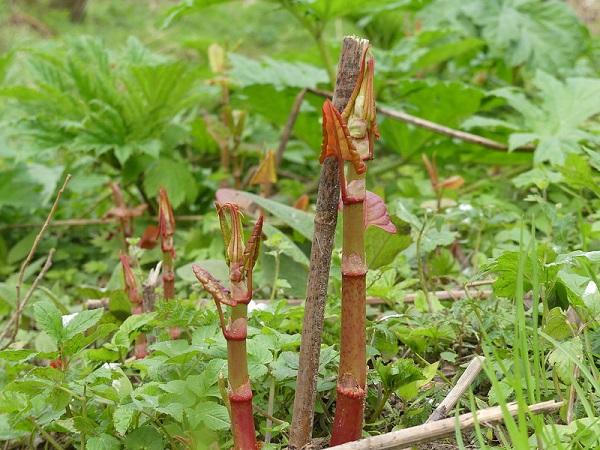
Japanese knotweed (Fallopia japonica) is a herbaceous perennial. What this means is that, at the end of every autumn, the plant dies down and its roots lie dormant throughout the winter. It regrows its shoots in spring and reaches peak growth in the summer months, when it can grow by as much as 10 centimetres per day!
This cycle means that knotweed looks completely different at different times of year, sometimes making it tricky to identify. It's March at time of writing, which means we're approaching that time of year when we can expect Japanese knotweed shoots to start popping up.
Of course, spring is a time when just about every plant is starting to blossom and bloom. So how do we know Japanese knotweed when we see it?
How to identify knotweed shoots
In the spring, Japanese knotweed ends its winter hibernation and shoots begin to push out from the ground. Initially, you will see what are known as 'spears' - as that name suggests, they emerge from the ground with a pointed tip, rather like a spear. Knotweed spears are reddish-purple in colour and have a wooden-looking stem, not unlike bamboo.
When summer arrives, knotweed will grow a thick foliage that's packed with heart-shaped green leaves, but during the spring these leaves will mostly remain furled up close to the stems. Japanese knotweed grows fastest in summer, but it can still grow pretty quickly in the springtime!
If you think you have knotweed on your property, it's best to act fast. The team here at Taylor Weed Control can help - get in touch to request a free, no-obligation knotweed survey today. We'll help you to identify whether the plant in question really is Japanese knotweed, and if it is, we'll recommend the best course of action.
Request a FREE Survey
Why is it important to identify Japanese knotweed?
Knotweed can have a detrimental effect on your property in a number of ways. The plant can decrease the value of your home, and you'll be legally required to disclose its presence to future buyers.
If you are planning to sell a property that is (or has been) affected by Japanese knotweed, the Taylor Total Weed Control team can provide specialist assistance. Our experienced professionals know exactly what mortgage lenders are looking for, and we can provide a comprehensive report that outlines the affected areas, the plant's proximity to your property, and a suitable treatment plan.
Japanese Knotweed Mortgage Reports
If you have any unanswered questions about Japanese knotweed, please don't hesitate to reach out and contact us here at Taylor Total Weed Control. We'll do everything we can to answer your questions and help you find the right solution to deal with your knotweed problem.
Get in Touch
READ MORE: What Does Japanese Knotweed Look Like in Spring?
Japanese knotweed young stems by Scottish Invasive Species Initiative is licensed under CC BY 2.0
